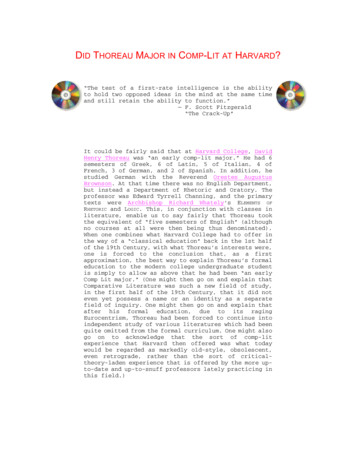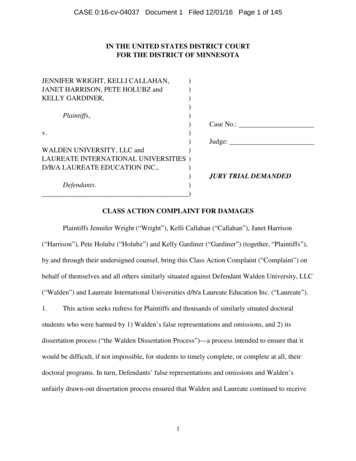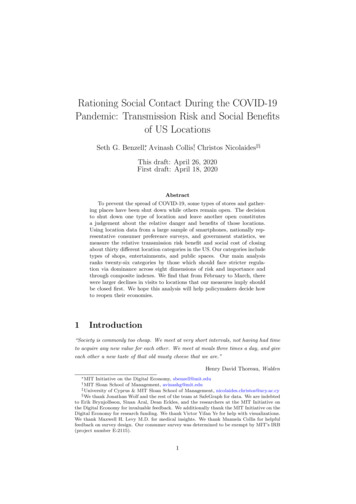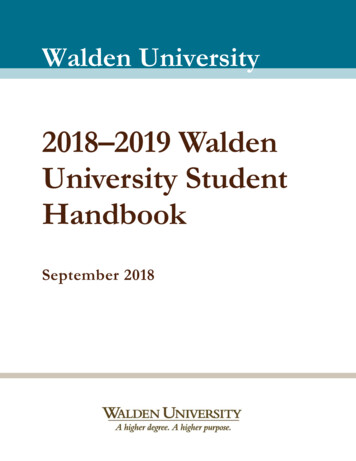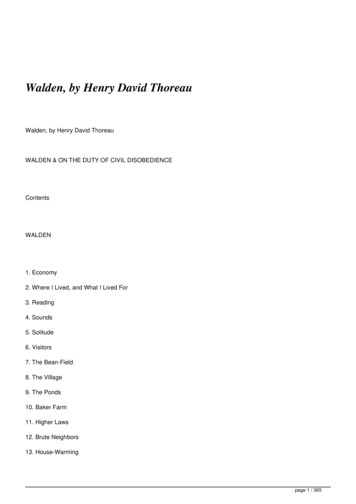
Transcription
Walden, by Henry David ThoreauWalden, by Henry David ThoreauWALDEN & ON THE DUTY OF CIVIL DISOBEDIENCEContentsWALDEN1. Economy2. Where I Lived, and What I Lived For3. Reading4. Sounds5. Solitude6. Visitors7. The Bean-Field8. The Village9. The Ponds10. Baker Farm11. Higher Laws12. Brute Neighbors13. House-Warmingpage 1 / 365
14. Inhabitants and Winter Visitors15. Winter Animals16. The Pond in Winter17. Spring18. Conclusion-- On the Duty of Civil Disobedience --EconomyWhen I wrote the following pages, or rather the bulk of them, Ilived alone, in the woods, a mile from any neighbor, in a housewhich I had built myself, on the shore of Walden Pond, in Concord,Massachusetts, and earned my living by the labor of my hands only.I lived there two years and two months. At present I am a sojournerin civilized life again.I should not obtrude my affairs so much on the notice of myreaders if very particular inquiries had not been made by mytownsmen concerning my mode of life, which some would callimpertinent, though they do not appear to me at all impertinent,but, considering the circumstances, very natural and pertinent.Some have asked what I got to eat; if I did not feel lonesome; if Iwas not afraid; and the like. Others have been curious to learnwhat portion of my income I devoted to charitable purposes; andsome, who have large families, how many poor children I maintained.I will therefore ask those of my readers who feel no particularinterest in me to pardon me if I undertake to answer some of thesepage 2 / 365
questions in this book. In most books, the I, or first person, isomitted; in this it will be retained; that, in respect to egotism,is the main difference. We commonly do not remember that it is,after all, always the first person that is speaking. I should nottalk so much about myself if there were anybody else whom I knew aswell. Unfortunately, I am confined to this theme by the narrownessof my experience. Moreover, I, on my side, require of every writer,first or last, a simple and sincere account of his own life, and notmerely what he has heard of other men's lives; some such account ashe would send to his kindred from a distant land; for if he haslived sincerely, it must have been in a distant land to me. Perhapsthese pages are more particularly addressed to poor students. Asfor the rest of my readers, they will accept such portions as applyto them. I trust that none will stretch the seams in putting on thecoat, for it may do good service to him whom it fits.I would fain say something, not so much concerning the Chineseand Sandwich Islanders as you who read these pages, who are said tolive in New England; something about your condition, especially youroutward condition or circumstances in this world, in this town, whatit is, whether it is necessary that it be as bad as it is, whetherit cannot be improved as well as not. I have travelled a good dealin Concord; and everywhere, in shops, and offices, and fields, theinhabitants have appeared to me to be doing penance in a thousandremarkable ways. What I have heard of Bramins sitting exposed tofour fires and looking in the face of the sun; or hanging suspended,with their heads downward, over flames; or looking at the heavensover their shoulders "until it becomes impossible for them to resumetheir natural position, while from the twist of the neck nothing butpage 3 / 365
liquids can pass into the stomach"; or dwelling, chained for life,at the foot of a tree; or measuring with their bodies, likecaterpillars, the breadth of vast empires; or standing on one leg onthe tops of pillars -- even these forms of conscious penance arehardly more incredible and astonishing than the scenes which I dailywitness. The twelve labors of Hercules were trifling in comparisonwith those which my neighbors have undertaken; for they were onlytwelve, and had an end; but I could never see that these men slew orcaptured any monster or finished any labor. They have no friendIolaus to burn with a hot iron the root of the hydra's head, but assoon as one head is crushed, two spring up.I see young men, my townsmen, whose misfortune it is to haveinherited farms, houses, barns, cattle, and farming tools; for theseare more easily acquired than got rid of. Better if they had beenborn in the open pasture and suckled by a wolf, that they might haveseen with clearer eyes what field they were called to labor in. Whomade them serfs of the soil? Why should they eat their sixty acres,when man is condemned to eat only his peck of dirt? Why should theybegin digging their graves as soon as they are born? They have gotto live a man's life, pushing all these things before them, and geton as well as they can. How many a poor immortal soul have I metwell-nigh crushed and smothered under its load, creeping down theroad of life, pushing before it a barn seventy-five feet by forty,its Augean stables never cleansed, and one hundred acres of land,tillage, mowing, pasture, and woodlot! The portionless, whostruggle with no such unnecessary inherited encumbrances, find itlabor enough to subdue and cultivate a few cubic feet of flesh.But men labor under a mistake. The better part of the man ispage 4 / 365
soon plowed into the soil for compost. By a seeming fate, commonlycalled necessity, they are employed, as it says in an old book,laying up treasures which moth and rust will corrupt and thievesbreak through and steal. It is a fool's life, as they will findwhen they get to the end of it, if not before. It is said thatDeucalion and Pyrrha created men by throwing stones over their headsbehind them:--Inde genus durum sumus, experiensque laborum,Et documenta damus qua simus origine nati.Or, as Raleigh rhymes it in his sonorous way,--"From thence our kind hard-hearted is, enduring pain and care,Approving that our bodies of a stony nature are."So much for a blind obedience to a blundering oracle, throwing thestones over their heads behind them, and not seeing where they fell.Most men, even in this comparatively free country, through mereignorance and mistake, are so occupied with the factitious cares andsuperfluously coarse labors of life that its finer fruits cannot beplucked by them. Their fingers, from excessive toil, are too clumsyand tremble too much for that. Actually, the laboring man has notleisure for a true integrity day by day; he cannot afford to sustainthe manliest relations to men; his labor would be depreciated in themarket. He has no time to be anything but a machine. How can hepage 5 / 365
remember well his ignorance -- which his growth requires -- who hasso often to use his knowledge? We should feed and clothe himgratuitously sometimes, and recruit him with our cordials, before wejudge of him. The finest qualities of our nature, like the bloom onfruits, can be preserved only by the most delicate handling. Yet wedo not treat ourselves nor one another thus tenderly.Some of you, we all know, are poor, find it hard to live, aresometimes, as it were, gasping for breath. I have no doubt thatsome of you who read this book are unable to pay for all the dinnerswhich you have actually eaten, or for the coats and shoes which arefast wearing or are already worn out, and have come to this page tospend borrowed or stolen time, robbing your creditors of an hour.It is very evident what mean and sneaking lives many of you live,for my sight has been whetted by experience; always on the limits,trying to get into business and trying to get out of debt, a veryancient slough, called by the Latins aes alienum, another's brass,for some of their coins were made of brass; still living, and dying,and buried by this other's brass; always promising to pay, promisingto pay, tomorrow, and dying today, insolvent; seeking to curryfavor, to get custom, by how many modes, only not state-prisonoffenses; lying, flattering, voting, contracting yourselves into anutshell of civility or dilating into an atmosphere of thin andvaporous generosity, that you may persuade your neighbor to let youmake his shoes, or his hat, or his coat, or his carriage, or importhis groceries for him; making yourselves sick, that you may lay upsomething against a sick day, something to be tucked away in an oldchest, or in a stocking behind the plastering, or, more safely, inthe brick bank; no matter where, no matter how much or how little.page 6 / 365
I sometimes wonder that we can be so frivolous, I may almostsay, as to attend to the gross but somewhat foreign form ofservitude called Negro Slavery, there are so many keen and subtlemasters that enslave both North and South. It is hard to have aSouthern overseer; it is worse to have a Northern one; but worst ofall when you are the slave-driver of yourself. Talk of a divinityin man! Look at the teamster on the highway, wending to market byday or night; does any divinity stir within him? His highest dutyto fodder and water his horses! What is his destiny to him comparedwith the shipping interests? Does not he drive for SquireMake-a-stir? How godlike, how immortal, is he? See how he cowersand sneaks, how vaguely all the day he fears, not being immortal nordivine, but the slave and prisoner of his own opinion of himself, afame won by his own deeds. Public opinion is a weak tyrant comparedwith our own private opinion. What a man thinks of himself, that itis which determines, or rather indicates, his fate.Self-emancipation even in the West Indian provinces of the fancy andimagination -- what Wilberforce is there to bring that about?Think, also, of the ladies of the land weaving toilet cushionsagainst the last day, not to betray too green an interest in theirfates! As if you could kill time without injuring eternity.The mass of men lead lives of quiet desperation. What is calledresignation is confirmed desperation. From the desperate city yougo into the desperate country, and have to console yourself with thebravery of minks and muskrats. A stereotyped but unconsciousdespair is concealed even under what are called the games andamusements of mankind. There is no play in them, for this comesafter work. But it is a characteristic of wisdom not to dopage 7 / 365
desperate things.When we consider what, to use the words of the catechism, is thechief end of man, and what are the true necessaries and means oflife, it appears as if men had deliberately chosen the common modeof living because they preferred it to any other. Yet they honestlythink there is no choice left. But alert and healthy naturesremember that the sun rose clear. It is never too late to give upour prejudices. No way of thinking or doing, however ancient, canbe trusted without proof. What everybody echoes or in silencepasses by as true to-day may turn out to be falsehood to-morrow,mere smoke of opinion, which some had trusted for a cloud that wouldsprinkle fertilizing rain on their fields. What old people say youcannot do, you try and find that you can. Old deeds for old people,and new deeds for new. Old people did not know enough once,perchance, to fetch fresh fuel to keep the fire a-going; new peopleput a little dry wood under a pot, and are whirled round the globewith the speed of birds, in a way to kill old people, as the phraseis. Age is no better, hardly so well, qualified for an instructoras youth, for it has not profited so much as it has lost. One mayalmost doubt if the wisest man has learned anything of absolutevalue by living. Practically, the old have no very important adviceto give the young, their own experience has been so partial, andtheir lives have been such miserable failures, for private reasons,as they must believe; and it may be that they have some faith leftwhich belies that experience, and they are only less young than theywere. I have lived some thirty years on this planet, and I have yetto hear the first syllable of valuable or even earnest advice frommy seniors. They have told me nothing, and probably cannot tell mepage 8 / 365
anything to the purpose. Here is life, an experiment to a greatextent untried by me; but it does not avail me that they have triedit. If I have any experience which I think valuable, I am sure toreflect that this my Mentors said nothing about.One farmer says to me, "You cannot live on vegetable foodsolely, for it furnishes nothing to make bones with"; and so hereligiously devotes a part of his day to supplying his system withthe raw material of bones; walking all the while he talks behind hisoxen, which, with vegetable-made bones, jerk him and his lumberingplow along in spite of every obstacle. Some things are reallynecessaries of life in some circles, the most helpless and diseased,which in others are luxuries merely, and in others still areentirely unknown.The whole ground of human life seems to some to have been goneover by their predecessors, both the heights and the valleys, andall things to have been cared for. According to Evelyn, "the wiseSolomon prescribed ordinances for the very distances of trees; andthe Roman praetors have decided how often you may go into yourneighbor's land to gather the acorns which fall on it withouttrespass, and what share belongs to that neighbor." Hippocrates haseven left directions how we should cut our nails; that is, even withthe ends of the fingers, neither shorter nor longer. Undoubtedlythe very tedium and ennui which presume to have exhausted thevariety and the joys of life are as old as Adam. But man'scapacities have never been measured; nor are we to judge of what hecan do by any precedents, so little has been tried. Whatever havebeen thy failures hitherto, "be not afflicted, my child, for whoshall assign to thee what thou hast left undone?"page 9 / 365
We might try our lives by a thousand simple tests; as, forinstance, that the same sun which ripens my beans illumines at oncea system of earths like ours. If I had remembered this it wouldhave prevented some mistakes. This was not the light in which Ihoed them. The stars are the apexes of what wonderful triangles!What distant and different beings in the various mansions of theuniverse are contemplating the same one at the same moment! Natureand human life are as various as our several constitutions. Whoshall say what prospect life offers to another? Could a greatermiracle take place than for us to look through each other's eyes foran instant? We should live in all the ages of the world in an hour;ay, in all the worlds of the ages. History, Poetry, Mythology! -- Iknow of no reading of another's experience so startling andinforming as this would be.The greater part of what my neighbors call good I believe in mysoul to be bad, and if I repent of anything, it is very likely to bemy good behavior. What demon possessed me that I behaved so well?You may say the wisest thing you can, old man -- you who have livedseventy years, not without honor of a kind -- I hear an irresistiblevoice which invites me away from all that. One generation abandonsthe enterprises of another like stranded vessels.I think that we may safely trust a good deal more than we do.We may waive just so much care of ourselves as we honestly bestowelsewhere. Nature is as well adapted to our weakness as to ourstrength. The incessant anxiety and strain of some is a well-nighincurable form of disease. We are made to exaggerate the importanceof what work we do; and yet how much is not done by us! or, what ifwe had been taken sick? How vigilant we are! determined not to livepage 10 / 365
by faith if we can avoid it; all the day long on the alert, at nightwe unwillingly say our prayers and commit ourselves touncertainties. So thoroughly and sincerely are we compelled tolive, reverencing our life, and denying the possibility of change.This is the only way, we say; but there are as many ways as therecan be drawn radii from one centre. All change is a miracle tocontemplate; but it is a miracle which is taking place everyinstant. Confucius said, "To know that we know what we know, andthat we do not know what we do not know, that is true knowledge."When one man has reduced a fact of the imagination to be a fact tohis understanding, I foresee that all men at length establish theirlives on that basis.Let us consider for a moment what most of the trouble andanxiety which I have referred to is about, and how much it isnecessary that we be troubled, or at least careful. It would besome advantage to live a primitive and frontier life, though in themidst of an outward civilization, if only to learn what are thegross necessaries of life and what methods have been taken to obtainthem; or even to look over the old day-books of the merchants, tosee what it was that men most commonly bought at the stores, whatthey stored, that is, what are the grossest groceries. For theimprovements of ages have had but little influence on the essentiallaws of man's existence; as our skeletons, probably, are not to bedistinguished from those of our ancestors.By the words, necessary of life, I mean whatever, of all thatman obtains by his own exertions, has been from the first, or fromlong use has become, so important to human life that few, if any,whether from savageness, or poverty, or philosophy, ever attempt topage 11 / 365
do without it. To many creatures there is in this sense but onenecessary of life, Food. To the bison of the prairie it is a fewinches of palatable grass, with water to drink; unless he seeks theShelter of the forest or the mountain's shadow. None of the brutecreation requires more than Food and Shelter. The necessaries oflife for man in this climate may, accurately enough, be distributedunder the several heads of Food, Shelter, Clothing, and Fuel; fornot till we have secured these are we prepared to entertain the trueproblems of life with freedom and a prospect of success. Man hasinvented, not only houses, but clothes and cooked food; and possiblyfrom the accidental discovery of the warmth of fire, and theconsequent use of it, at first a luxury, arose the present necessityto sit by it. We observe cats and dogs acquiring the same secondnature. By proper Shelter and Clothing we legitimately retain ourown internal heat; but with an excess of these, or of Fuel, that is,with an external heat greater than our own internal, may not cookeryproperly be said to begin? Darwin, the naturalist, says of theinhabitants of Tierra del Fuego, that while his own party, who werewell clothed and sitting close to a fire, were far from too warm,these naked savages, who were farther off, were observed, to hisgreat surprise, "to be streaming with perspiration at undergoingsuch a roasting." So, we are told, the New Hollander goes nakedwith impunity, while the European shivers in his clothes. Is itimpossible to combine the hardiness of these savages with theintellectualness of the civilized man? According to Liebig, man'sbody is a stove, and food the fuel which keeps up the internalcombustion in the lungs. In cold weather we eat more, in warm less.The animal heat is the result of a slow combustion, and disease andpage 12 / 365
death take place when this is too rapid; or for want of fuel, orfrom some defect in the draught, the fire goes out. Of course thevital heat is not to be confounded with fire; but so much foranalogy. It appears, therefore, from the above list, that theexpression, animal life, is nearly synonymous with the expression,animal heat; for while Food may be regarded as the Fuel which keepsup the fire within us -- and Fuel serves only to prepare that Foodor to increase the warmth of our bodies by addition from without -Shelter and Clothing also serve only to retain the heat thusgenerated and absorbed.The grand necessity, then, for our bodies, is to keep warm, tokeep the vital heat in us. What pains we accordingly take, not onlywith our Food, and Clothing, and Shelter, but with our beds, whichare our night-clothes, robbing the nests and breasts of birds toprepare this shelter within a shelter, as the mole has its bed ofgrass and leaves at the end of its burrow! The poor man is wont tocomplain that this is a cold world; and to cold, no less physicalthan social, we refer directly a great part of our ails. Thesummer, in some climates, makes possible to man a sort of Elysianlife. Fuel, except to cook his Food, is then unnecessary; the sunis his fire, and many of the fruits are sufficiently cooked by itsrays; while Food generally is more various, and more easilyobtained, and Clothing and Shelter are wholly or half unnecessary.At the present day, and in this country, as I find by my ownexperience, a few implements, a knife, an axe, a spade, awheelbarrow, etc., and for the studious, lamplight, stationery, andaccess to a few books, rank next to necessaries, and can all beobtained at a trifling cost. Yet some, not wise, go to the otherpage 13 / 365
side of the globe, to barbarous and unhealthy regions, and devotethemselves to trade for ten or twenty years, in order that they maylive -- that is, keep comfortably warm -- and die in New England atlast. The luxuriously rich are not simply kept comfortably warm,but unnaturally hot; as I implied before, they are cooked, of coursea la mode.Most of the luxuries, and many of the so-called comforts oflife, are not only not indispensable, but positive hindrances to theelevation of mankind. With respect to luxuries and comforts, thewisest have ever lived a more simple and meagre life than the poor.The ancient philosophers, Chinese, Hindoo, Persian, and Greek, werea class than which none has been poorer in outward riches, none sorich in inward. We know not much about them. It is remarkable thatwe know so much of them as we do. The same is true of the moremodern reformers and benefactors of their race. None can be animpartial or wise observer of human life but from the vantage groundof what we should call voluntary poverty. Of a life of luxury thefruit is luxury, whether in agriculture, or commerce, or literature,or art. There are nowadays professors of philosophy, but notphilosophers. Yet it is admirable to profess because it was onceadmirable to live. To be a philosopher is not merely to have subtlethoughts, nor even to found a school, but so to love wisdom as tolive according to its dictates, a life of simplicity, independence,magnanimity, and trust. It is to solve some of the problems oflife, not only theoretically, but practically. The success of greatscholars and thinkers is commonly a courtier-like success, notkingly, not manly. They make shift to live merely by conformity,practically as their fathers did, and are in no sense thepage 14 / 365
progenitors of a noble race of men. But why do men degenerate ever?What makes families run out? What is the nature of the luxury whichenervates and destroys nations? Are we sure that there is none ofit in our own lives? The philosopher is in advance of his age evenin the outward form of his life. He is not fed, sheltered, clothed,warmed, like his contemporaries. How can a man be a philosopher andnot maintain his vital heat by better methods than other men?When a man is warmed by the several modes which I havedescribed, what does he want next? Surely not more warmth of thesame kind, as more and richer food, larger and more splendid houses,finer and more abundant clothing, more numerous, incessant, andhotter fires, and the like. When he has obtained those things whichare necessary to life, there is another alternative than to obtainthe superfluities; and that is, to adventure on life now, hisvacation from humbler toil having commenced. The soil, it appears,is suited to the seed, for it has sent its radicle downward, and itmay now send its shoot upward also with confidence. Why has manrooted himself thus firmly in the earth, but that he may rise in thesame proportion into the heavens above? -- for the nobler plants arevalued for the fruit they bear at last in the air and light, farfrom the ground, and are not treated like the humbler esculents,which, though they may be biennials, are cultivated only till theyhave perfected their root, and often cut down at top for thispurpose, so that most would not know them in their flowering season.I do not mean to prescribe rules to strong and valiant natures,who will mind their own affairs whether in heaven or hell, andperchance build more magnificently and spend more lavishly than therichest, without ever impoverishing themselves, not knowing how theypage 15 / 365
live -- if, indeed, there are any such, as has been dreamed; nor tothose who find their encouragement and inspiration in precisely thepresent condition of things, and cherish it with the fondness andenthusiasm of lovers -- and, to some extent, I reckon myself in thisnumber; I do not speak to those who are well employed, in whatevercircumstances, and they know whether they are well employed or not;-- but mainly to the mass of men who are discontented, and idlycomplaining of the hardness of their lot or of the times, when theymight improve them. There are some who complain most energeticallyand inconsolably of any, because they are, as they say, doing theirduty. I also have in my mind that seemingly wealthy, but mostterribly impoverished class of all, who have accumulated dross, butknow not how to use it, or get rid of it, and thus have forged theirown golden or silver fetters.If I should attempt to tell how I have desired to spend my lifein years past, it would probably surprise those of my readers whoare somewhat acquainted with its actual history; it would certainlyastonish those who know nothing about it. I will only hint at someof the enterprises which I have cherished.In any weather, at any hour of the day or night, I have beenanxious to improve the nick of time, and notch it on my stick too;to stand on the meeting of two eternities, the past and future,which is precisely the present moment; to toe that line. You willpardon some obscurities, for there are more secrets in my trade thanin most men's, and yet not voluntarily kept, but inseparable fromits very nature. I would gladly tell all that I know about it, andnever paint "No Admittance" on my gate.I long ago lost a hound, a bay horse, and a turtle dove, and ampage 16 / 365
still on their trail. Many are the travellers I have spokenconcerning them, describing their tracks and what calls theyanswered to. I have met one or two who had heard the hound, and thetramp of the horse, and even seen the dove disappear behind a cloud,and they seemed as anxious to recover them as if they had lost themthemselves.To anticipate, not the sunrise and the dawn merely, but, ifpossible, Nature herself! How many mornings, summer and winter,before yet any neighbor was stirring about his business, have I beenabout mine! No doubt, many of my townsmen have met me returningfrom this enterprise, farmers starting for Boston in the twilight,or woodchoppers going to their work. It is true, I never assistedthe sun materially in his rising, but, doubt not, it was of the lastimportance only to be present at it.So many autumn, ay, and winter days, spent outside the town,trying to hear what was in the wind, to hear and carry it express!I well-nigh sunk all my capital in it, and lost my own breath intothe bargain, running in the face of it. If it had concerned eitherof the political parties, depend upon it, it would have appeared inthe Gazette with the earliest intelligence. At other times watchingfrom the observatory of some cliff or tree, to telegraph any newarrival; or waiting at evening on the hill-tops for the sky to fall,that I might catch something, though I never caught much, and that,manna-wise, would dissolve again in the sun.For a long time I was reporter to a journal, of no very widecirculation, whose editor has never yet seen fit to print the bulkof my contributions, and, as is too common with writers, I got onlymy labor for my pains. However, in this case my pains were theirpage 17 / 365
own reward.For many years I was self-appointed inspector of snow-storms andrain-storms, and did my duty faithfully; surveyor, if not ofhighways, then of forest paths and all across-lot routes, keepingthem open, and ravines bridged and passable at all seasons, wherethe public heel had testified to their utility.I have looked after the wild stock of the town, which give afaithful herdsman a good deal of trouble by leaping fences; and Ihave had an eye to the unfrequented nooks and corners of the farm;though I did not always know whether Jonas or Solomon worked in aparticular field to-day; that was none of my business. I havewatered the red huckleberry, the sand cherry and the nettle-tree,the red pine and the black ash, the white grape and the yellowviolet, which might have withered else in dry seasons.In short, I went on thus for a long time (I may say it withoutboasting), faithfully minding my business, till it became more andmore evident that my townsmen would not after all admit me into thelist of town officers, nor make my place a sinecure with a moderateallowance. My accounts, which I can swear to have kept faithfully,I have, indeed, never got audited, still less accepted, still lesspaid and settled. However, I have not set my heart on that.Not long since, a strolling Indian went to sell baskets at thehouse of a well-known lawyer in my neighborhood. "Do you wish tobuy any baskets?" he asked. "No, we do not want any," was thereply. "What!" exclaimed the Indian as he went out the gate, "doyou mean to starve us?" Having seen his industrious white neighborsso well off -- that the lawyer had only to weave arguments, and, bysome magic, wealth and standing followed -- he had said to himself:page 18 / 365
I will go into business; I will weave baskets; it is a thing which Ican do. Thinking that when he had made the baskets he would havedone his part, and then it would be the white man's to buy them. Hehad not discovered that it was necessary for him to make it worththe other's while to buy them, or at least make him think that itwas so, or to m
Walden, by Henry David Thoreau Walden, by Henry David Thoreau WALDEN & ON THE DUTY OF CIVIL DISOBEDIENCE Contents WALDEN 1. Economy 2. Where I Lived, and What I Lived For 3. Reading 4. Sounds 5. Solitude 6. Visitors 7. The Bean-Field 8. The Village 9. The Ponds 10. Baker Farm 11. Higher Laws 12. Brute Neighbors 13. House-Warming page 1 / 365
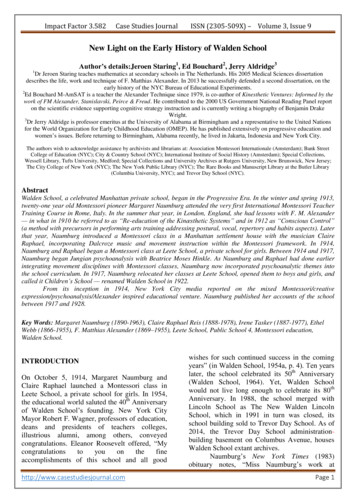


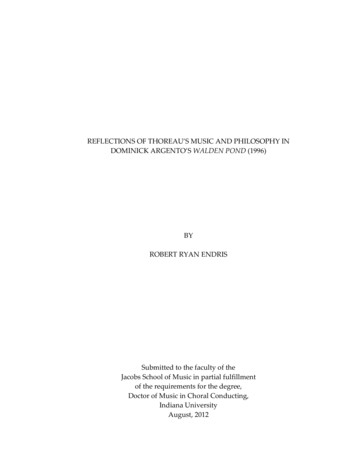
![No, David! (David Books [Shannon]) E Book](/img/65/no-20david-20david-20books-20shannon-20e-20book.jpg)
